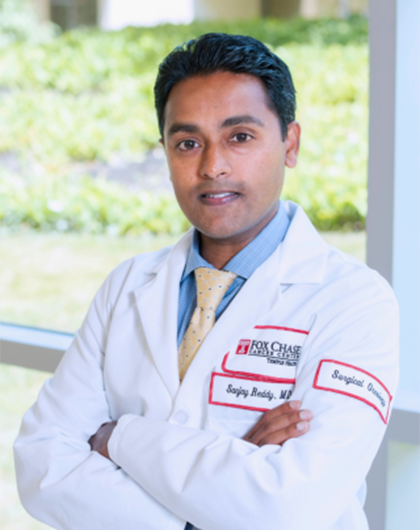Related Articles
00 / 00

Program Director:
Sanjay S. Reddy, MD, FACS
Chief, Division of Surgical Oncology
Professor of Surgical Oncology
Marvin S. Greenberg Endowed Chair in Pancreatic Cancer Surgery
Program Director, Complex General Surgical Oncology Fellowship
Assistant Program Director:
Andrea Porpiglia, MD, MSC, FACS
Program Coordinator:
Angela Knauss
The Complex General Surgical Oncology Fellowship is a two year program approved by the Accreditation Council for Graduate Medical Education (ACGME) and by the Society of Surgical Oncology (SSO). Established in 1986, the fellowship became SSO-certified in 1991 and ACGME-accredited in 2012. Each year, three fellows are accepted through the National Resident Matching Program (NRMP).
As part of the CGSO Fellowship program, Fox Chase Cancer Center provides highly comprehensive training of well-rounded surgical oncologists so they may offer the necessary experience and skill set to practice in any setting and any disease site. The clinical rotations are designed to provide robust, diverse experiences that simulate eventual independent practice.
The operative experience is high-volume and concurrently focused on exposure to unusual and high-complexity procedures. Advanced oncologic techniques such as cytoreductive surgery with heated intraperitoneal chemotherapy, isolated limb infusion, hepatic arterial infusion pump placement, liver ablation, minimally invasive nodal dissections, and robotic surgical approaches are standard.
In addition to a robust experience in the operating room, fellows will attend tumor boards for disease sites relevant to their current rotation, as well as clinics in which they have the opportunity to formulate treatment plans with attending oversight.
The fellowship employs a mentorship model for the core CGSO rotations (GI, HPB, melanoma, sarcoma) whereby the fellow spends 1-2 months with a single attending. On these services, the fellow attends all the same clinics, cases and conferences to drive continuity of care and achieve optimal simulation of independent practice.
In the first year, fellows will gain a wide exposure to the breadth of Surgical Oncology. Rotations include:
In the second year, fellows focus on core CGSO rotations in preparation for independent practice. Rotations include:
In recognizing the importance of training fellows to the highest technical standards, Fox Chase houses a CGSO-oriented robotic surgery curriculum. As the curriculum aims to engage learners at all levels, recognizing trainee exposure to robotic surgery in residency will be variable. The curriculum encompasses:
Fellows who wish to receive an equivalency certificate from Intuitive can do so via completion of the curriculum. For more information, contact course director Dr. Anthony Villano ([email protected]).
Supplementing the fellows’ education with high-yield lectures is a top priority at Fox Chase. In addition to the core clinical curriculum above, fellows will attend the following:
Fox Chase also hosts weekly noon oncology lectures by basic and translational scientists, which are optional but highly beneficial for those interested in research pursuits.
Fox Chase hosts dedicated, weekly tumor boards for all the disease sites it treats. The fellows attend and present at these conferences, participating directly in the multidisciplinary discussion of individual cases.
As outlined in the curriculum, fellows attend a weekly preoperative planning conference where indications for treatment, multidisciplinary strategies, and technical pearls are reviewed. Dedicated practice for oral boards is a key component of this conference.
The fellows also attend a weekly educational didactic where they attend lectures from CGSO faculty as well as faculty from other departments (Medical Oncology, Radiation Oncology, Pathology, Palliative Care). Fellows deliver NCCN Guidelines-focused lectures as well to facilitate mastery of the material.
Applicants must have successfully completed a residency in an ACGME-accredited general surgery program in the United States or Canada accredited by the Royal College of Physicians and Surgeons of Canada. Foreign students must have graduated from a medical school accredited by the Educational Commission for Foreign Medical Graduates.
Applications must be completed through ERAS (Electronic Residency Application Service). The match is conducted through NRMP. The application process begins in December and is open to fourth-year general surgery residents. Deadlines and additional information may be found on the SSO website.
For information on benefit synopsis with current stipend, sample contract, medical licensure examination requirement policy, and other helpful information, please visit the Temple University Hospital Recruitment page.
For more information about the fellowship application process, please contact:
Sanjay Reddy, MD, FACS
Program Director
Complex General Surgical Oncology Fellowship
[email protected]
Andrea Porpiglia, MD, MSC, FACS
Assistant Program Director
Complex General Surgical Oncology Fellowship
[email protected]
Angela Knauss
GME Sr. Program Manager
Fox Chase Cancer Center
333 Cottman Avenue, C-308
Philadelphia, PA 19111
Phone: 215-313-8202
[email protected]